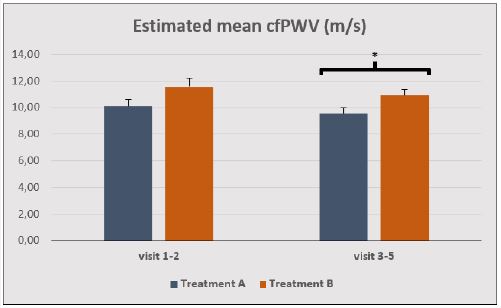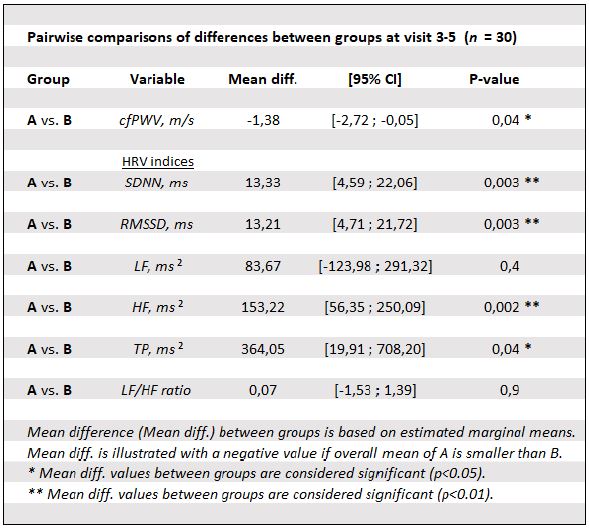Session Information
Session Type: Poster Session A
Session Time: 9:00AM-11:00AM
Background/Purpose: Systemic Lupus Erythematosus (SLE) is a chronic inflammatory autoimmune disease with an increased risk of atherosclerosis. The development of atherosclerosis in SLE cannot be fully explained by traditional risk factors but may be partially due to chronic inflammation. SLE is associated with abnormal autonomic function i.e., decreased parasympathetic vagus nerve activity. Impaired vagal activity may impact disease severity through an impaired vagally mediated inflammatory reflex, which may lead to increased inflammation, and possibly to stiffening of conduit arteries i.e., increased arterial stiffness. In SLE patients, we aim to determine whether impaired vagus nerve activity is associated with arterial stiffness and whether the latter can be diminished by increasing vagal activity through transcutaneous vagus nerve stimulation (tVNS).
Methods: This is a blinded sub-study (n=30) of an ongoing double-blinded, randomized, sham-controlled study investigating the effects of tVNS on SLE (n=58). In the first intervention period, patients were randomized to self-administration of either active or sham bilateral tVNS at the cervical vagus nerve for 120 seconds 4 times daily for seven days. After a stimulation-free two-week wash-out period, tVNS was self-administered for 120 seconds 2 times daily for eight weeks in the second intervention period. Pulse wave velocity (PWV), which is a gold standard method for non-invasive arterial stiffness assessment, pulse wave velocity (PWV), was recorded at two arterial sites, i.e., carotid-femoral PWV (cfPWV). Autonomic function was assessed using a VagusTM device that measured 5-min resting heart rate variability. Data was analyzed using a linear mixed model in SPSS.
Results: The groups were divided into A or B. However, the main study was still blinded at the time of this thesis, thus Group A was selected as the active treatment group for purpose of a meaningful discussion. Group-A (n=17) and group-B (n=13) were similar in age (51.6±14.1, 46.6±17.6 years), sex (94.1%, 86.4% females), and in the prevalence of hypertension and hypercholesterolemia. In unadjusted analyses, higher baseline cfPWV correlated with lower degrees of autonomic function in all but one measure (p< 0.05). During the second and longer intervention period (8 weeks), Group-A displayed a lower cfPWV, i.e., less stiff arteries, than Group B (mean difference 1.38 m/s, p=0.04).
Conclusion: In SLE, autonomic dysfunction was associated with arterial stiffness at baseline. Arterial stiffness was reduced with Treatment A, indicating a reduced the risk of vascular disease with vagus nerve stimulation in SLE. However, this needs to be verified after unblinding the main study.
To cite this abstract in AMA style:
Schmidt T, Brock C, Fleischer J, Jacobsen S, Zinglersen A. The Impact of Impaired Vagus Nerve Activity and Transcutaneous Vagus Nerve Stimulation (tVNS) on Arterial Stiffness in Systemic Lupus Erythematosus (SLE) [abstract]. Arthritis Rheumatol. 2023; 75 (suppl 9). https://acrabstracts.org/abstract/the-impact-of-impaired-vagus-nerve-activity-and-transcutaneous-vagus-nerve-stimulation-tvns-on-arterial-stiffness-in-systemic-lupus-erythematosus-sle/. Accessed .« Back to ACR Convergence 2023
ACR Meeting Abstracts - https://acrabstracts.org/abstract/the-impact-of-impaired-vagus-nerve-activity-and-transcutaneous-vagus-nerve-stimulation-tvns-on-arterial-stiffness-in-systemic-lupus-erythematosus-sle/



